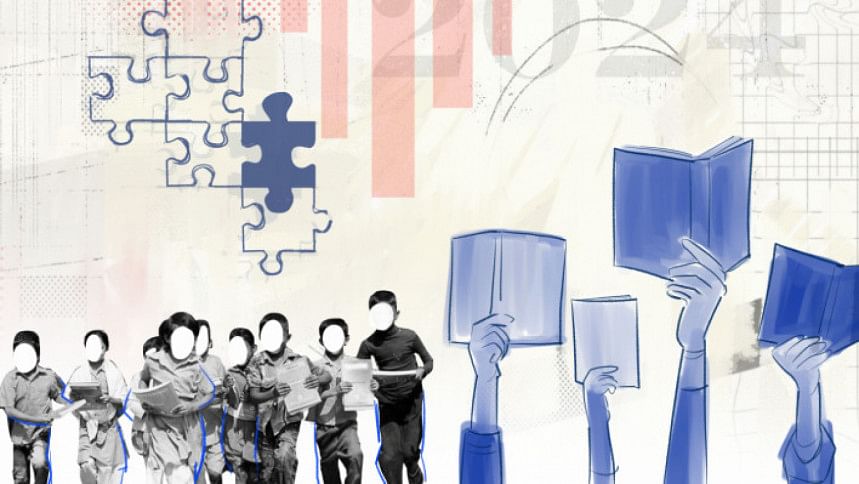Awami League’s education policy to be scrapped

The interim government has decided to cancel the education policy adopted in 2010 during the Sheikh Hasina government's tenure, describing it as "improper and unimplementable".
Since the country's independence, it is the sixth education policy scrapped by successive governments, according to education ministry officials.
"We have decided to scrap the current education policy. We will soon declare a new education commission to formulate a new education policy. We are confident that the members of this panel will do a wonderful job," said Prof Aminul Islam, special assistant to Education Adviser Prof Wahiduddin Mahmud.
"The new commission will ensure that no controversy centring the new policy arises," Prof Aminul told The Daily Star, adding that they will announce the names of the commission members soon.
When asked about the reasons behind scrapping the 2010 policy, Prof Aminul said it was "totally improper and it will not bring any good."
Prof Aminul, who enjoys the status of state minister, said that many major features of the current education policy remain unimplemented, which proves that it is "unimplementable".
While talking at Daffodil International University yesterday, Prof Aminul said the new commission will comprise distinguished, renowned, talented, and skilled individuals from both national and international arenas.
Efforts were underway to bring transformative changes through increased budget allocations and other forms of support, he added.
A top education ministry official said that they initiated the move to scrap the education policy and formulate a new one recently. The ministry is likely to send the names of members of the new education policy commission to the Chief Adviser's Offices within two to three working days.
Prof Siddiqur Rahman, a former director of Dhaka University's Institute of Education and Research and a member of the 2010 Education Policy Formulation Committee, said it was "unfortunate" that their recommendations have remained "unimplemented".
"The 2010 education policy had some good recommendations for the betterment of education in the country. The new education policy framers can have a look at it and if they find these good, they can take it," he said while speaking to this newspaper.
Rasheda K Choudhury, executive director of Campaign for Popular Education (CAMPE), hoped that the members of the new commission would emphasise modernising and increasing the quality of education.
They should recommend measures to control growing discrimination in education, she said while speaking to The Daily Star.
The new commission should also make recommendations on ensuring free of cost education up to class 8, adequate salary for teachers and the improvement of their quality of work, she said.
The policymakers will need to take steps to have a comprehensive education law like neighbouring India, Sri Lanka and Nepal have, she added.
The first education policy was formulated in 1972 under the leadership of Qudrat-e-Khuda but it was not fully implemented. Later, successive governments formed commissions and committees to formulate new education policies — one led by Majid Uddin Ahmed in 1983; one by Prof Shamsul Haque in 1997; another led by MA Bari in 2001 and Prof Moniruzzaman Miah in 2003.
But none of these policies were implemented fully, education ministry officials said. Even the report of the 2010 commission mentioned that since the independence of Bangladesh, it has not been possible for the country to implement any education policy.
The current National Education Policy was passed in parliament on December 7, 2010, after the Education Policy Formulation Committee was formed in April 2009 with National Professor Kabir Chowdhury and eminent economist Qazi Kholiquzzaman Ahmad as the chair and co-chair respectively.
Education ministry officials said many major features of the 2010 education policy have remained unimplemented, including the formulation of a consolidated education law, a permanent and statutory National Education Commission, a separate pay scale for teachers of all levels, and primary education up to class 8.
The commission in its report said it was necessary to take immediate steps to make adjustments between the educational qualification and technical expertise in line with the demand of the job market so that employment facilities can be ensured for the students after completing their education.
It also recommended appropriate remedial measures to control and discourage private tuition and coaching centres that have become rampant in the country due to various malpractices in the traditional education system.
But all these recommendations have remained unimplemented.

 For all latest news, follow The Daily Star's Google News channel.
For all latest news, follow The Daily Star's Google News channel. 




Comments